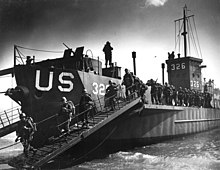




Amphibious Training Base (ATB)(USNATB) Advance Amphibious Training Base are United States Armed Forces bases used for the training of amphibious warfare.[1] Starting with World War II, United States Navy began large-scale amphibious assaults of beaches. To train troops in the use of Amphibious warfare ships and Amphibious Combat Vehicles the Navy established training bases both on the US mainland and overseas at US Naval Advance Bases. The Training involved the United States Navy working with The United States Marine Corps, United States Army and in later years sometimes the United States Air Force for air support.[2][3][4]
- ^ "Prelude to Liberation: Genesis of American Amphibious Assault in the ETO". The National WWII Museum | New Orleans. November 8, 2022.
- ^ Seward W. Livermore, " American Naval Base Policy in the Far East", Pacific Historical Review; 13, pgs/ 113–135.
- ^ "The Problems Facing United States Marine Corps Amphibious Assaults". www.usmcu.edu.
- ^ Amphibious Training, US War Department, youtube.com
